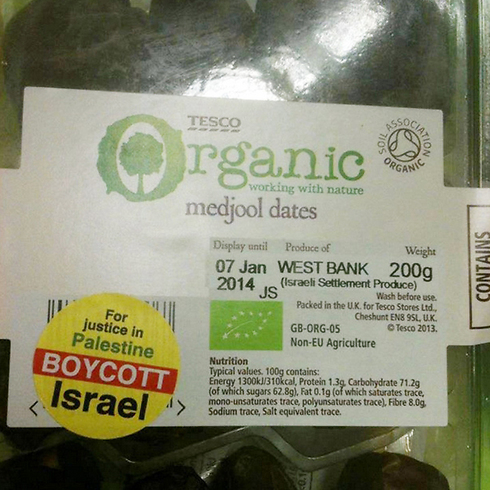
EU: Peace talks failure will lead to labeling of settlement goods
If peace negotiations end in failure, sanction debate could grow, says EU Mideast envoy, citing discussion to tag Jewish West Bank products, effectively facilitating consumers boycott. Is Israel facing surge of support for boycott efforts?
Support in Europe for sanctioning Israel over its settlement policies is growing and could gain steam if the current Israeli-Palestinian negotiations fail, the outgoing EU envoy to the Middle East said Thursday.
For now, the European Union is dangling incentives before both sides to nudge them toward a deal, rather than threatening punishment but some commentators have been sounding the alarm regarding a possible surge in boycott efforts.
Related stories:
- Source: 14 EU countries in favor of banning settlements products
- American Studies Association approves boycott of Israel
- Israel frets US scholars forum's boycott may inspire others
Earlier this week, EU foreign ministers promised Israelis and Palestinians unprecedented access to the 28-state bloc if they overcome their differences and reach an agreement on the terms of a Palestinian state.
The outgoing EU envoy to the Middle East, Andreas Reinicke, said in a phone interview from Brussels on Thursday that he believes a deal is possible and that the two sides "are starting to bridge the first gaps."
He did not elaborate, but Reinicke, who is leaving his post at the end of the month, said he has been in close touch with US mediators.
Reinicke said that when he started in his post in February 2012, only two of 28 EU member states supported the idea of labeling. Now, 14 states are in favor, he said. "There is movement in this direction," he added.
"I think there is a general understanding among all 28 states that settlements are illegal under international law as long as there is no agreement on the border" between Israel and a state of Palestine, he said.
Palestinian grassroots activists and their foreign supporters say an international campaign of boycott, divestment and sanctions – or BDS – against Israel is gaining momentum.
They point to recent successes, such as a decision this week by the American Studies Association, a group representing more than 3,800 US scholars, to boycott Israeli academic institutions, though not individual Israeli colleagues.
The BDS successes have been largely symbolic, and their impact on Israel's robust economy has so far been negligible.
Israeli government officials have either dismissed the BDS campaign as ineffective or portrayed it as an attempt with strong anti-Semitic overtones to delegitimize the Jewish state.
Ron Dermer, the Israeli ambassador to the US, denounced the boycott decision of the US scholars as a "travesty," saying this week that "singling out of the Jewish state for boycott is no different than the many attempts throughout history to single out Jews and hold them to a different standard."
The US-led negotiations resumed in late July, after a five-year diplomatic impasse, and are to last for at least nine months. On Wednesday, the chief Palestinian negotiator, Saeb Erekat, for the first time raised the possibility of an extension if progress is made.
He said that if the two sides reach a framework agreement on all main issues by the end of April, the Palestinians would be prepared to extend the period of negotiations by up to a year to work out the details of a comprehensive deal.
Previously, the Palestinians had said they reserve the right to walk away from the negotiations after nine months and explore other options, such as seeking wider international recognition.
The Palestinians want a state in the West Bank, Gaza Strip and eastern Jerusalem, territories captured in 1967. They are ready for minor land swaps that would enable Israel to keep some of the dozens of settlements it has built on war-won land.
However, Prime Minister Benjamin Netanyahu has refused to accept the 1967 lines as a starting point for border talks and has rejected a partition of Jerusalem.
Reinicke said that if negotiations end in failure, he expects a resumption of discussions on possible EU-wide recommendations on labeling Israeli settlement products. Labeling would allow consumers to decide if they want to such goods.
Mandela's legacy
In Israel, the aftermath of Mandela's death and the recent BDS successes have sparked a domestic "boycott debate."
Shmuel Inbar, a Middle East analyst, said Israel isn't facing a serious threat. "I don't think that five months from now, the key issue on the international agenda is to start to go on a crusade for boycotting Israel," he said. He said Europeans will realize "that they have much bigger problems to attend to."
However, several liberal commentators said Israel must heed the warning signs.
"For various reasons, the Western governments have turned a blind eye to the Israeli violation of human rights" in the occupied territories up to now, Aviad Kleinberg, a history professor at Tel Aviv University, wrote in Yediot Ahronoth.
"They usually make do with feeble condemnations and voicing pious concern for the future of 'the conflict'. It appears as though this policy of turning a blind eye is going to end," he wrote.
PA aid
Reinicke said that before the resumption of talks, donor countries, including EU member states, had also been reviewing the level of aid to the Palestinian Authority, the self-rule government in parts of the West Bank.
The aid began in 1994, and was initially intended for five years, to ease Palestinian transition into statehood. Donor countries have since continued paying hundreds of millions of dollars a year, despite the ongoing failure of efforts to set up a Palestinian state through negotiations.
In their discussions before the resumption of this round of talks, donor countries had begun asking "how long will we be able to pay for Palestinian institution-building if there is no chance that these institutions will evolve into a state," he said.
The debate has been put on hold for now, Reinicke said. "I'm sure that if (Israeli-Palestinian) negotiations will move in a positive way, toward a framework agreement, no one will question" the continuation of aid payments, he said.
- Receive Ynetnews updates directly to your desktop











